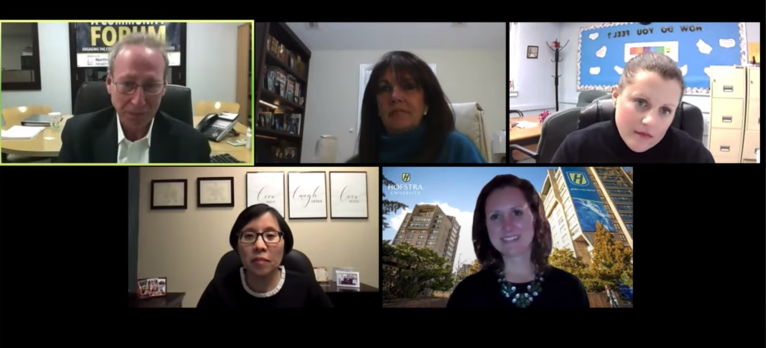
Despite the laundry list of negative effects the coronavirus pandemic has had on the world since last March, educational advisers and school counselors on Long Island touted the effectiveness and helpfulness that technology has had for students applying to colleges.
The discussion was a virtual event conducted by Blank Slate Media on Thursday evening. Featured on the panel were Claire Fitzgibbon, the director of undergraduate admissions at Hofstra University, Christine Loo, the director of college counseling at the Stony Brook School, Joy-Anne D’Anca, the director of counseling services for the Manhasset school district, and Jamie L. Reich, a professional college adviser and the founder and owner of JLR Advising.
Reich said she has had to adapt to the “new normal” of meeting with students virtually via Zoom or FaceTime rather than face to face. Reich said she had some initial concerns meeting remotely with students, but has been pleasantly surprised how effective the interactions have been since the pandemic began.
“I actually was concerned about [meeting remotely], but I think it has turned out to be much better than I thought,” Reich said. “Kids are super focused and they know that they don’t have to travel to get to my office, so they’re saving some time. They could be in their pajamas so they’re happy with that too and we get a lot of stuff done.”
Fitzgibbon said the accessibility to most colleges has increased since the beginning of the pandemic. With travel bans and two-week quarantine protocols being in effect for nearly the past year, the process of visiting a college and experiencing its atmosphere became burdensome and almost impossible to do.
“No longer do you have to get on an airplane to go visit a school in California … and could ‘visit’ many schools in different states all in one day,” Fitzgibbon said.
One of the most prominent effects that the pandemic has had on society was the loss of jobs and shuttering of local businesses. Loo said Stony Brook had students whose parents had lost their jobs, but said the financial aid department remained flexible with current and prospective students.
“For a majority of our students, they weren’t adversely impacted,” Loo said. “We definitely did have some parents who did lose their jobs and they had to take finances more into account while looking at colleges. I’d say where we really saw that impact was with our international population.”
Gap years, according to D’Anca, were an interesting topic of discussion with students looking to potentially take a year off, wait for the pandemic to subside and increase their chances of getting into a good college the following year. D’Anca said gap years are “a nice thought” but students should take everything into account before making the decision.
“I’m not seeing it a great deal right now,” D’Anca said. “I do have it in the back of my mind that later on if their first choices don’t come through and there’s an inkling that a gap year could help their chances of getting into their first school that I might be seeing it later on.”
Reich touted the need to maintain constant communication with students throughout the entire application process, primarily to know that their mental health and well-being is being prioritized. Reich encouraged students to not be afraid to reach out to an adviser, counselor or anyone else that can provide some aid and insight on any troubles they may be experiencing.
“I always tell my students ‘no one is a mind-reader,’ so if you’re having an issue, open your mouth and ask the right person what to do,” she said. “I actually stay in touch with all of my students for a year or two, and I don’t hound them, but every so often I ask them to tell me what’s new. I also have students who call me and they say ‘I’m really struggling.’ Parents also don’t always know because they don’t get their kids’ grades once they’re 18 years old.”
Loo agreed, noting that colleges and universities are dealing with teenagers who are still coping with the fact that they are living in a global pandemic while trying to continue their education. She said that Stony Brook’s advisory counselors check in with their in-person and remote students roughly twice a week.
“We have to remember that we are dealing with 16-17-year-olds who are still living in a global pandemic, they have gone through a summer where there were all sorts of issues with racial injustice, I think that the mental health issues should not be forgotten in all of this,” Loo said.






